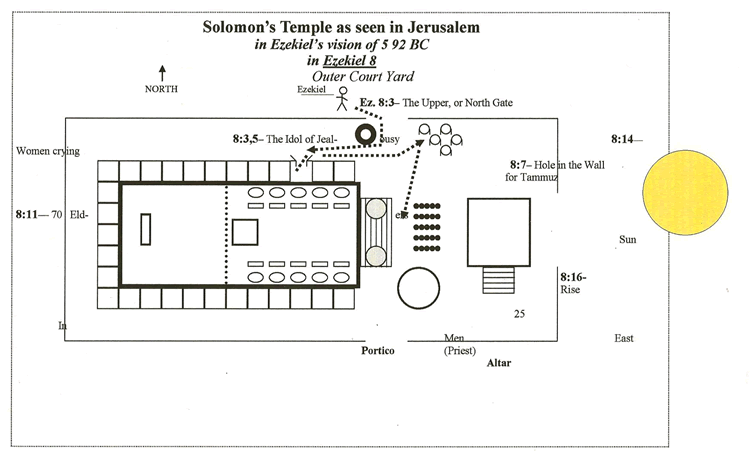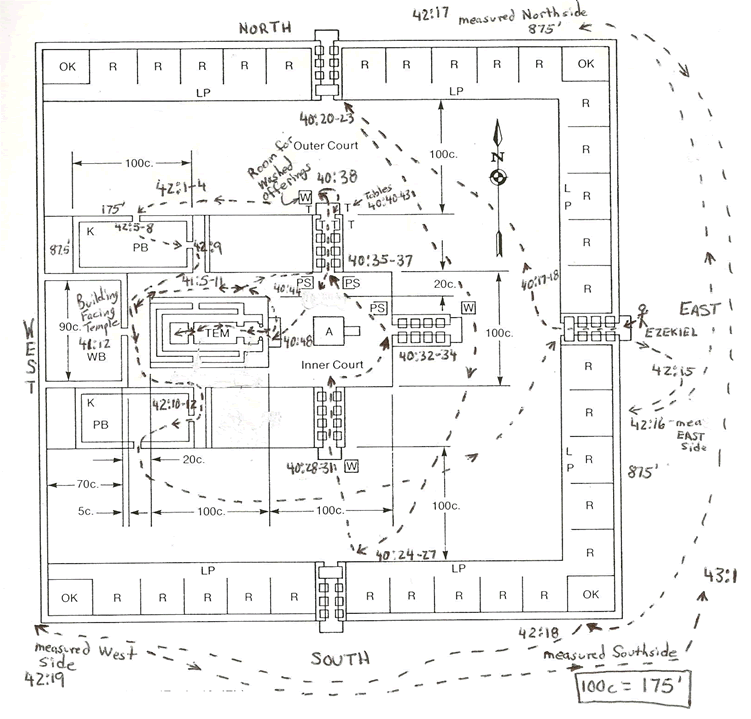1. This is the temple that Solomon
built. It was used in Ezekiel's day
before the Babylonian captivity for idol worship.
2. The furniture still there from the
original purpose was the bronze altar, the bronze basin, the ten lamp stands,
the ten tables, the altar of incense and the ark of the
covenant.
3. The two pillars out front of the holy
place on the portico were called "Jakin"
and "Boaz."
4. Only priest could enter the holy place
and did most of the work in the inner court around the bronze altar and bronze
basin.
5. Until the days of Ezekiel the presence of
God dwelt in the
6. Notice the three gates: the Upper (North) Gate, the main entry known
as the East Gate, and the southern gate

1. In Ezekiel 8:1, on Sept.17, 592 BC,
Ezekiel was taken from
2. Ezekiel is shown four things that God
says shows why the people of
3. ONE:
When Ezekiel went into the temple through the North Gate he saw the idol
of jealousy. Most
likely an Asherah pole.
4. TWO:
Then Ezekiel was told to dig through the wall and he saw images of idols
drawn on the wall of the priestly rooms around the temple. There were 70 leaders of
5. THREE: Ezekiel is then shown women crying
for Tammuz. Tammuz was a false god who
controlled the dry seasons and the seasons of rain. At the time of this vision it was the dry
season (September) and the women were seeking Tammuz for the rain.
6. FOUR:
The last line of defense for a nation is the priest
who were to teach the people the Word of God. The Word was revealed to them in the written
Law of Moses and the temple system of worship.
The last hope for these people was that the priesthood would teach them
the truth. But, the priests were
standing between the altar and the portico of the temple with their backs to
the temple worshipping the rising sun.
Things do not look to hopeful for

1. Ezekiel 9:1 God says, "Bring the
guards of the city here, each with a weapon in his hand." Then six
angels that had been guarding the city come in to receive orders to destroy the
people.
2. Also, a man with a writing kit (a case to
carry reed pens with an inkhorn attached) is told to put a mark (The Hebrew
letter "taw", an "x") on the people who mourn for the
wicked things done in the city.
3. The Lord leaves the ark
of the covenant and moves to the door way (threshhold)
of the temple to give instructions to the angels. (9:3)
4. The angel with the writing kit goes out
into the city first to begin marking the faithful. These will be spared.
5. The angels with the "deadly
weapons" (Hebrew "slaughter weapon" like a crushing device such
as a battle ax, but not a sword) begin by slaughtering the 25 priest by the
altar in front of the temple.

1. In 9:5 the destroying angels leave the
temple for the city. They leave behind a
temple court defiled with dead bodies of the priest.
2. Ezekiel pleads with God for mercy. But, the purpose of this vision is to convince
Ezekiel that the people must be destroyed.
3. In 9:11 the angel with the writing kit
returns and says, "I have done as you commanded."
4. This same scribe angel is told by God,
who is at the door of the temple, to go to the cheribum
under the throne/expanse on the south side of the temple and get burning coals.
5. This fire is the judgment that will be
scattered over the city.
6. Ezekiel stresses that this vision of the
glory of God in
7. God is leaving

1. God leaves the temple and goes to the
throne carried by the cherubim on the south side of the temple. (10:18)
2. The cherubim move with the glory of the
Lord to the east gate.
3. Ezekiel is given an explanation by God
from His position by the east gate. This is chapter 11:1-21.
4. At the end of chapter 11 in verse 23 God
leaves the temple and moves east of the city to the
5. In six years the manifestation of this
vision occurs when Nebuchadnezzar's army burns the city. (586 BC)
6. Ezekiel returns to the exile elders in
his house and tells them what he has seen (11:23-25).
7. This vision is the subject of Ezekiel's
spoken messages in chapters 12-19

